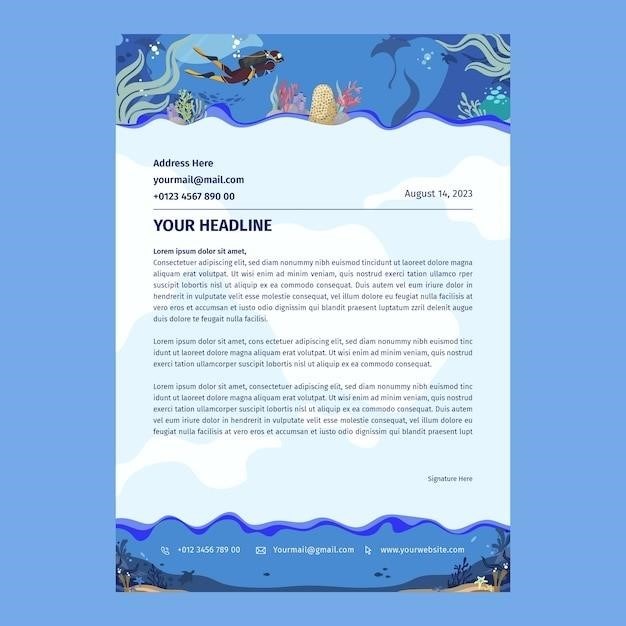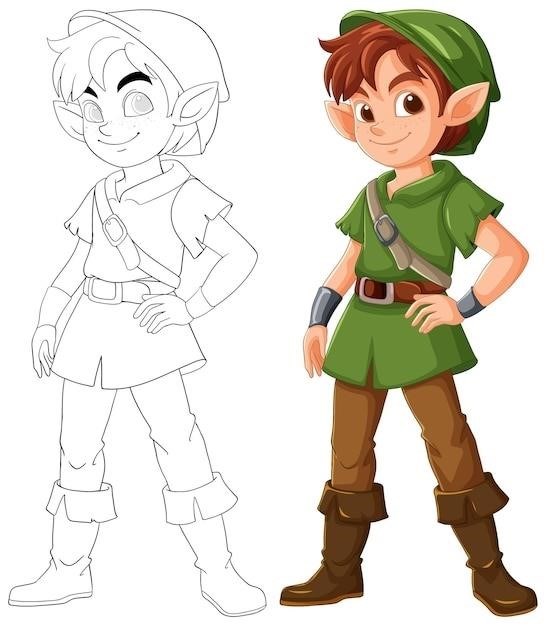The Shallows⁚ What the Internet Is Doing to Our Brains
This book explores the impact of the internet on our brains, arguing that it is changing the way we think, read, and remember․ Nicholas Carr, the author, examines how the internet’s constant stream of information and distractions is leading to a shallower, more fragmented way of thinking․ He also discusses the potential consequences of this shift, including a decline in our ability to focus, engage in deep thought, and retain information․
About the Book
“The Shallows⁚ What the Internet Is Doing to Our Brains” is a 2010 book by American journalist Nicholas Carr, exploring the impact of the internet on our cognitive abilities․ Carr argues that the constant stimulation and distraction of the internet is leading to a decline in our ability to focus, engage in deep thought, and retain information․ He draws parallels to the transition from oral to print culture, suggesting that the internet is transforming the way we think in a profound and potentially detrimental way․
The book is divided into seven chapters, each exploring a different aspect of the internet’s impact on our brains․ Carr examines the effects of the internet on our attention span, memory, reading comprehension, and learning abilities․ He also discusses the implications of these changes for our culture and society․ “The Shallows” has been praised for its insightful analysis and thought-provoking arguments․ It has also been criticized for its alarmist tone and its lack of empirical evidence․
Author
Nicholas Carr, the author of “The Shallows⁚ What the Internet Is Doing to Our Brains,” is an American journalist and author known for his insightful and thought-provoking writing on technology and its impact on society․ He has written extensively on the internet, its effects on our brains, and the changing nature of work and knowledge in the digital age․
Carr’s work has been featured in publications such as The Atlantic, The New York Times, and Wired․ He has also authored several other books, including “The Big Switch⁚ Rewiring the World, from Edison to Google” and “Does IT Matter? Information Technology and the Corrosion of Contemporary Culture․” Carr’s writing style is known for its clarity, eloquence, and ability to weave together complex ideas into engaging narratives․

Key Themes
“The Shallows” explores several key themes surrounding the internet’s influence on our cognitive abilities and how we interact with information․ Some central themes include the impact of the internet on our attention spans, memory, and ability to engage in deep thinking․ Carr argues that the constant stream of information and distractions available online is leading to a shallower and more fragmented way of thinking, hindering our ability to focus, concentrate, and retain information․ He also explores the implications of this shift for our ability to learn, read, and engage in complex thought processes․ Another key theme is the contrast between the linear, focused reading experience offered by books and the fragmented, hyperlinked reading experience of the internet․ Carr contends that the internet’s hypertextual nature encourages a more superficial approach to reading and information consumption, potentially leading to a decline in our capacity for deep understanding and critical analysis․
The Impact of the Internet on Our Brains
Carr argues that the internet’s constant barrage of information and distractions is fundamentally altering our brains, leading to a decline in our ability to engage in deep thought and focus․ He suggests that the internet’s hypertextual nature encourages a more superficial approach to information consumption, fragmenting our attention and hindering our capacity for sustained concentration․ Carr draws a parallel between the internet’s impact and the way television was once criticized for its influence on our brains․ He posits that the internet’s constant stimulation and rapid pace of information exchange are rewiring our brains, making us less capable of deep reading, critical analysis, and sustained contemplation․ This shift, he argues, has implications for our ability to learn, problem-solve, and engage in creative thinking․ Carr’s exploration delves into the potential consequences of this internet-induced cognitive shift, raising concerns about the long-term effects on our intellectual capabilities and ability to navigate an increasingly complex world․

The Internet and Deep Thinking
Carr argues that the internet’s constant stream of distractions and information fragments our attention, making it increasingly difficult to engage in deep thinking․ He contends that the internet’s hypertextual nature encourages a superficial approach to information consumption, leading to a decline in our ability to focus and engage in sustained contemplation․ Carr suggests that the internet’s fast-paced nature, with its constant flow of notifications and updates, hinders our capacity for slow, deliberate thought processes․ He further argues that the internet’s emphasis on instant gratification and quick answers discourages the kind of sustained reflection and critical thinking that are essential for problem-solving and creative endeavors․ Carr’s exploration raises concerns about the internet’s potential to hinder our ability to engage in deep thinking, a crucial cognitive skill for intellectual growth and problem-solving in a complex world․
The Internet and Memory
Carr delves into the impact of the internet on our memory, suggesting that our reliance on external sources of information, readily available online, may be weakening our ability to retain information․ He argues that the constant access to information at our fingertips may be reducing our need to commit facts and figures to memory, leading to a decline in our cognitive capacity for recall․ Carr posits that the internet’s vastness and the ease of access to information make it tempting to rely on search engines and online databases as external memory banks, neglecting to internalize information through deeper processing and memorization․ He explores the potential consequences of this shift, including a diminished ability to form long-term memories and a decreased capacity for critical analysis and synthesis of information․ Carr’s examination of memory challenges us to consider how our reliance on the internet might be shaping our cognitive abilities and the long-term implications for knowledge retention and intellectual development․
The Internet and Attention Span
Carr explores the impact of the internet on our attention spans, arguing that the constant bombardment of stimuli and distractions online is leading to a decline in our ability to focus for extended periods․ He suggests that the internet’s design, characterized by hyperlinks, notifications, and constant updates, encourages a fragmented and shallow approach to information consumption․ This constant stream of information can make it difficult to maintain focus and engage in deep, sustained thought, leading to a shortened attention span․ Carr argues that this shift in attention patterns has implications for our ability to engage in complex tasks, absorb information effectively, and develop critical thinking skills․ He highlights the potential consequences of this decline in attention span, including decreased productivity, difficulty in acquiring new knowledge, and a diminished capacity for contemplation and reflection․
The Internet and Reading
Carr delves into the impact of the internet on our reading habits, arguing that the shift from linear, in-depth reading to the rapid scanning and skimming of online content is altering our comprehension and engagement with text․ He contrasts the immersive, contemplative experience of reading a book with the fragmented, superficial nature of online reading․ The internet’s hyperlinks, pop-up ads, and constant notifications disrupt the flow of reading, making it difficult to maintain focus and fully absorb the content․ Carr suggests that this change in reading practices has implications for our ability to process complex ideas, develop critical thinking skills, and cultivate a deep understanding of subject matter․ He highlights the potential consequences of this shift, including a decline in reading comprehension, difficulty in engaging with lengthy and challenging texts, and a diminished appreciation for the nuances of language and thought․
The Internet and Learning
Carr explores the implications of the internet’s influence on learning, questioning whether the constant barrage of information and distractions hinders our ability to acquire knowledge effectively․ He argues that the internet’s emphasis on speed and efficiency may undermine the process of deep learning, which requires time, focus, and reflection․ The constant interruptions, notifications, and hyperlinks can create a fragmented and shallow learning experience, making it difficult to engage with complex concepts, develop critical thinking skills, and retain information over time․ Carr suggests that the internet, while offering valuable resources and opportunities for learning, can also contribute to a superficial understanding of knowledge, potentially impacting our ability to think critically and engage in meaningful discussions․ He emphasizes the importance of creating learning environments that encourage focused attention, deep engagement, and the development of critical thinking skills, as opposed to simply consuming information passively․
Criticisms of the Book
Despite its widespread acclaim, “The Shallows” has also faced criticism․ Some argue that Carr’s analysis is overly pessimistic, suggesting that he underestimates the internet’s potential for fostering deeper learning and critical thinking․ Critics point to the vast array of online resources, educational platforms, and interactive learning tools that can enhance our understanding and engagement with complex topics․ They argue that the internet can be a powerful tool for expanding our knowledge base and developing new skills, particularly when used strategically and with a focus on critical engagement․ Additionally, some critics question Carr’s reliance on anecdotal evidence and his generalizations about the impact of the internet on all users․ They suggest that individual experiences and choices play a significant role in shaping how we interact with technology and its influence on our cognitive abilities․
The Shallows⁚ A Controversial Book
“The Shallows” has sparked heated debates and polarized opinions since its publication․ Its central thesis, that the internet is fundamentally altering our cognitive abilities and leading to a decline in deep thinking, has resonated with some readers, who see their own experiences reflected in Carr’s observations․ However, others have dismissed the book’s arguments as alarmist and hyperbolic, suggesting that Carr overstates the internet’s negative effects․ The book’s controversial nature lies in its exploration of a complex and rapidly evolving relationship between technology and human cognition․ It challenges us to critically examine the ways in which we engage with the digital world and consider the potential consequences of our increasing reliance on technology for information, communication, and entertainment․ The ongoing debate surrounding “The Shallows” highlights the importance of ongoing dialogue and research into the evolving impact of technology on our minds and society․
The Shallows⁚ A Must-Read for the Digital Age
In an era dominated by the internet and its constant influx of information, “The Shallows” serves as a timely and thought-provoking wake-up call․ Carr’s exploration of the internet’s impact on our brains is a crucial read for anyone navigating the digital age․ The book encourages us to question our relationship with technology and consider the potential downsides of our ever-increasing reliance on the internet․ It provides valuable insights into the cognitive changes that may be occurring as a result of our constant online engagement and offers a compelling argument for developing more mindful and balanced digital habits․ Whether you agree with all of Carr’s conclusions or not, “The Shallows” is a stimulating and essential read for anyone interested in understanding the complex and evolving relationship between technology and human cognition in the digital age;
“The Shallows” concludes by urging readers to take a more conscious and deliberate approach to their interaction with the internet․ Carr advocates for a more balanced use of technology, recognizing its potential benefits while acknowledging its potential drawbacks․ He emphasizes the importance of cultivating deep thinking, focused attention, and meaningful engagement with the world beyond the digital realm․ The book serves as a powerful reminder that while the internet offers incredible opportunities for connection and knowledge, it is crucial to maintain a sense of balance and mindful engagement to protect our cognitive abilities and foster a richer, more meaningful human experience․
Where to Find a PDF
Finding a free PDF of “The Shallows” can be challenging, as the book is subject to copyright protection․ However, some resources may offer access to the book․ Online libraries and academic databases sometimes provide digital versions of books, though these may require a subscription or membership․ Additionally, websites like Academia․edu or ResearchGate might host research papers or excerpts from the book, which could be a valuable starting point․ It’s important to note that downloading or sharing copyrighted material without permission is illegal and unethical․ Always respect the intellectual property rights of authors and publishers․



